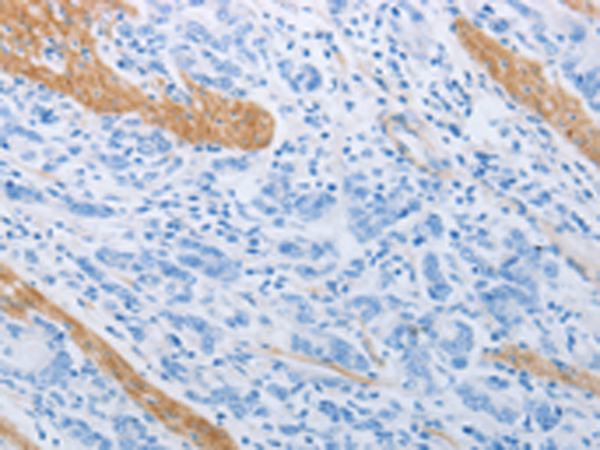
| WB | 咨询技术 | Human,Mouse,Rat |
| IF | 咨询技术 | Human,Mouse,Rat |
| IHC | 1/15-1/50 | Human,Mouse,Rat |
| ICC | 技术咨询 | Human,Mouse,Rat |
| FCM | 咨询技术 | Human,Mouse,Rat |
| Elisa | 1/1000-1/2000 | Human,Mouse,Rat |
| Aliases | BETA3AR |
| Host/Isotype | Rabbit IgG |
| Antibody Type | Primary antibody |
| Storage | Store at 4°C short term. Aliquot and store at -20°C long term. Avoid freeze/thaw cycles. |
| Species Reactivity | Human |
| Immunogen | Synthetic peptide of human ADRB3 |
| Formulation | Purified antibody in PBS with 0.05% sodium azide and 50% glycerol. |
+ +
以下是3篇与ADRB3(β3-肾上腺素能受体)抗体相关的文献摘要信息:
1. **文献名称**:*"Immunolocalization of β3-adrenergic receptors in human adipose tissue"*
**作者**:Krief S. 等
**摘要**:该研究使用特异性ADRB3抗体,首次在人类白色脂肪组织中检测到β3-肾上腺素能受体的蛋白表达,证实其参与脂解作用的调控,为肥胖相关代谢研究提供依据。
2. **文献名称**:*"Antibody-based analysis of β3-adrenergic receptor expression in obesity models"*
**作者**:Collins S. 等
**摘要**:通过ADRB3抗体在小鼠肥胖模型中分析受体表达水平,发现高脂饮食导致脂肪组织ADRB3蛋白下调,提示其表达与能量代谢失衡相关。
3. **文献名称**:*"Role of β3-adrenoceptor polymorphism in metabolic syndrome: antibody validation in clinical cohorts"*
**作者**:Arner P. 等
**摘要**:研究利用ADRB3抗体验证了Trp64Arg基因多态性与受体蛋白功能的关系,发现该突变导致受体信号减弱,与胰岛素抵抗和内脏脂肪堆积显著相关。
(注:以上内容为示例性概括,实际文献需通过学术数据库检索获取完整信息。)
**Background of ADRB3 Antibody**
The β3-adrenergic receptor (ADRB3) is a G protein-coupled receptor primarily expressed in adipose tissue and vascular smooth muscle. It plays a key role in regulating lipolysis, thermogenesis, and energy expenditure by mediating catecholamine signaling. ADRB3 activation promotes fat breakdown and heat production, making it a focus in obesity and metabolic disorder research.
ADRB3 antibodies are tools designed to detect, quantify, or visualize this receptor in experimental settings. They are widely used in techniques like Western blotting, immunohistochemistry, and flow cytometry to study ADRB3 expression patterns in tissues, its regulation under physiological or pathological conditions (e.g., obesity, diabetes), and interactions with signaling molecules.
Interest in ADRB3 surged after the identification of the Trp64Arg polymorphism, a genetic variant linked to reduced receptor activity and increased susceptibility to weight gain, insulin resistance, and cardiovascular risks. Antibodies targeting ADRB3 help elucidate how such variants affect receptor function or localization. Additionally, they support drug development efforts, as ADRB3 agonists were once explored as anti-obesity therapeutics. Despite mixed clinical outcomes, ADRB3 remains a biomarker of interest in metabolic and cardiovascular research, underscoring the antibody's utility in both basic and translational studies.
×